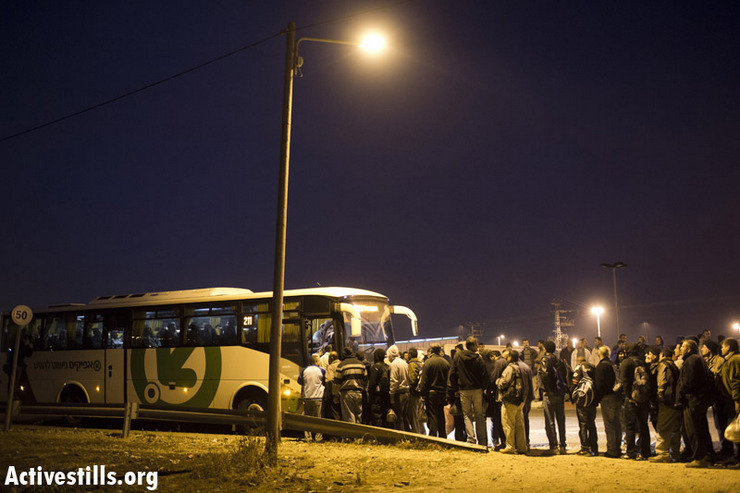After nearly 50 years of occupation, it has become impossible to differentiate between Israel’s ‘security concerns’ and flat-out apartheid policies.
By Hagai El-Ad
“So far as the issue is security, these considerations are relevant and the role of the minister of defense indeed is to defend Israeli citizens. And I also realized that he said he did not give that kind of directive, so it’s all okay […] but I realized that it’s the result of pressure from settlers who do not want to travel with Arabs on the bus. I read what was said at the Knesset committee discussion, [and] it is intolerable that they claim that they need to have their own buses, because no one got up for a woman or for someone old or it’s not convenient for them or unpleasant. That’s apartheid. Security is security. That is why I contacted the Attorney General asking him to look into this. If it’s security reasons per se, it’s something I can not only live with, but also back. But if it comes from settler, political pressure [because] it is not comfortable for them [and] unpleasant for them to travel with Arabs in the very places they wanted to live at, knowing that these are places where Palestinians live, that is unacceptable to me and I will work against that. This discrimination is prohibited by law in the State of Israel.”
This quote, from a recent radio interview with Justice Minister Tzipi Livni, is a uniquely transparent example of how people who perceive themselves as moral – Livni of course being one of them – manage to wrestle with themselves in order to justify acts that cannot be justified. After all, if an act were morally unacceptable, one would certainly be against it. But the desire is to succeed in holding on to a self-perception of being moral while also supporting the occupation. Therefore it is necessary to find a way, every time, to justify that which is unjust. In this way both the occupation and one’s morality can remain untouched.

This convoluted internal process has many variations, but it is not often that they are exposed so openly. Therefore it is worth pausing on Livni’s thought process, since these moral acrobatics serve as a key mechanism to sustaining the prolonged occupation.
The issue at hand, segregated buses, is morally unfathomable. In the words of the justice minister, it is apartheid. Something that is unacceptable, amounts to prohibited discrimination and is the result of unacceptable political pressure.
However the very same abomination, when properly explained by the defense minister using the justification of “security concerns,” is magically transformed from unspeakable “apartheid” into something that one can not only tolerate, but also publicly endorse.
Security concerns, indeed. Security concerns (and not the taking over of Palestinian land) that justify the “temporary” route of the separation barrier; security concerns (and not severing of Gaza from the West Bank) that are the core of the policy of continued closure of the Gaza Strip; security concerns (and, heaven forbid, not demographics) that explain the Citizenship Law; security considerations that are, of course, the only reason for the establishment of settlements and outposts, not to mention the need to protect them; and on and on. Indeed, what would happen to the moral justification of the occupation without “security considerations”?
But even if the moral flak jacket of “security considerations” is waived around endlessly, its essence remains intolerable. How can one calmly accept the very thing that has just been declared morally bankrupt?

Setting aside apologetic self-righteousness enables us to focus on the essence of the situation. Those actually concerned with that essence must come to the conclusion that it is not “okay” and that, indeed, it cannot be “okay.” Just like the segregated reality in the center of Hebron (motivated, of course, only by security concerns and fully backed by Israel’s High Court of Justice) will never be “okay.” Just like the fact that the settlers and the Palestinians answer to separate legal systems will never be “okay.” Just like will never be okay that all Palestinian demonstrations in the West Bank, for security reasons no doubt, are considered illegal. Just like the occupation will never be okay.
It is impossible to have it both ways: there is no moral occupation based on security excuses. Those who accept these excuses not only live with them in peace, but actually support them wholeheartedly. Those who do so are helping to perpetuate the occupation.
Hagai El-Ad is the executive director of B’Tselem. This article was first published on +972′s Hebrew-language sister site, Local Call. Read it in Hebrew here.
Related:
Segregating the evening commute to the West Bank
If this isn’t apartheid, then what is it?
What can we learn from the Israel apartheid analogy?

